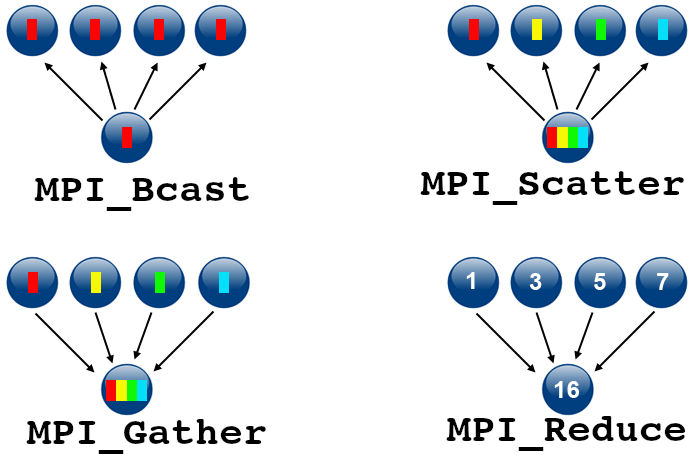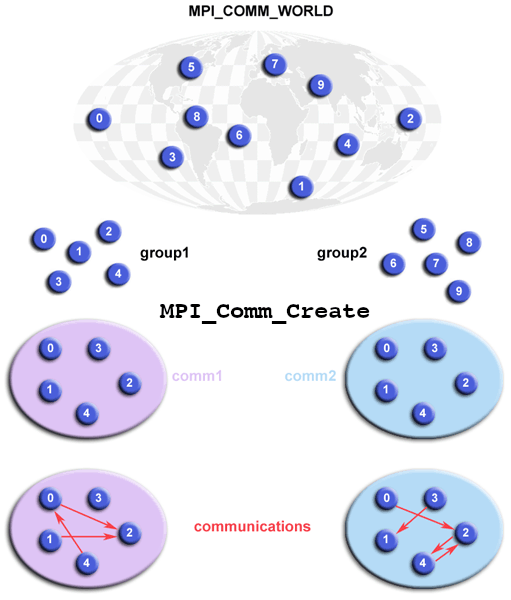Advanced Topics in MPI
Overview
Teaching: 0 min
Exercises: 60 minQuestions
How to use collective operations on MPI
Objectives
Learn about collective operations with MPI
More Collectives: Scatter and Gather
The MPI_Bcast and MPI_Reduce operations have more complex analogs that are very useful in a variety of algorithms.
Just like MPI_Bcast and MPI_Reduce, the benefit of using these routines, instead of point-to-point messages, is not only syntactical convenience but also much better efficiency.
They allow for swaths of data to be distributed from a root process to all other available processes, or data from all processes can be collected at one process.
These operators can eliminate the need for a surprising amount of boilerplate code via two functions:
Keep in mind that these are called “collective” because every PE in the communicator must call these routines at the same time.
Let’s take a look at the basic idea, and then we’ll see the wide variety of related routines.
USE mpi_f08
MPI_Scatter(sendbuf, sendcount, sendtype, recvbuf, recvcount, recvtype,
root, comm, ierror)
TYPE(*), DIMENSION(..), INTENT(IN) :: sendbuf
TYPE(*), DIMENSION(..) :: recvbuf
INTEGER, INTENT(IN) :: sendcount, recvcount, root
TYPE(MPI_Datatype), INTENT(IN) :: sendtype, recvtype
TYPE(MPI_Comm), INTENT(IN) :: comm
INTEGER, OPTIONAL, INTENT(OUT) :: ierror
MPI_Gather(sendbuf, sendcount, sendtype, recvbuf, recvcount, recvtype,
root, comm, ierror)
TYPE(*), DIMENSION(..), INTENT(IN) :: sendbuf
TYPE(*), DIMENSION(..) :: recvbuf
INTEGER, INTENT(IN) :: sendcount, recvcount, root
TYPE(MPI_Datatype), INTENT(IN) :: sendtype, recvtype
TYPE(MPI_Comm), INTENT(IN) :: comm
INTEGER, OPTIONAL, INTENT(OUT) :: ierror
In order to get a better grasp on these functions, let’s go ahead and create a program that will utilize the scatter function. Note that the gather function (not shown in the example) works similarly, and is essentially the converse of the scatter function. Further examples which utilize the gather function can be found in the MPI tutorials listed as resources at the beginning of this document.
Example of Scatter
This example shows how to spread the values of a 2 dimensional array across multiple processes
program scatter
use mpi_f08
integer, parameter :: nsize = 8
integer :: numtasks, rank, sendcount, recvcount, source, ierr
real, allocatable :: sendbuf(:, :), recvbuf(:)
call MPI_INIT(ierr)
call MPI_COMM_RANK(MPI_COMM_WORLD, rank, ierr)
call MPI_COMM_size(MPI_COMM_WORLD, numtasks, ierr)
allocate (sendbuf(nsize, numtasks))
allocate (recvbuf(nsize))
sendbuf = reshape([(i, i=1, nsize*numtasks)], [nsize, numtasks])
if (rank == 0) then
print *, ''
print *, 'Original array to be distributed:'
do i = 1, numtasks
print *, sendbuf(:, i)
end do
print *, ''
end if
call MPI_BARRIER(MPI_COMM_WORLD)
source = 1
sendcount = nsize
recvcount = nsize
call MPI_SCATTER(sendbuf, sendcount, MPI_REAL, recvbuf, recvcount, MPI_REAL, &
source, MPI_COMM_WORLD, ierr)
print *, 'rank= ', rank, ' recvbuf: ', recvbuf
call MPI_FINALIZE(ierr)
deallocate (sendbuf, recvbuf)
end program
Group and Communicator Management Routines
Groups and Communicators
A group is an ordered set of processes. Each process in a group is associated with a unique integer rank. Rank values start at zero and go to N-1, where N is the number of processes in the group. In MPI, a group is represented within system memory as an object. It is accessible to the programmer only by a “handle”. A group is always associated with a communicator object.
A communicator encompasses a group of processes that may communicate with each other. All MPI messages must specify a communicator. In the simplest sense, the communicator is an extra “tag” that must be included with MPI calls. Like groups, communicators are represented within system memory as objects and are accessible to the programmer only by “handles”. For example, the handle for the communicator that comprises all tasks is MPI_COMM_WORLD.
From the programmer’s perspective, a group and a communicator are one. The group routines are primarily used to specify which processes should be used to construct a communicator.
Primary Purposes of Group and Communicator Objects:
- Allow you to organize tasks, based upon function, into task groups.
- Enable Collective Communications operations across a subset of related tasks.
- Provide basis for implementing user defined virtual topologies.
- Provide for safe communications.
Programming Considerations and Restrictions:
Groups/communicators are dynamic - they can be created and destroyed during program execution.
Processes may be in more than one group/communicator. They will have a unique rank within each group/communicator.
MPI provides over 40 routines related to groups, communicators, and virtual topologies.
Typical usage:
- Extract handle of global group from MPI_COMM_WORLD using MPI_Comm_group
- Form new group as a subset of global group using MPI_Group_incl
- Create new communicator for new group using MPI_Comm_create
- Determine new rank in new communicator using MPI_Comm_rank
- Conduct communications using any MPI message passing routine
- When finished, free up new communicator and group (optional) using MPI_Comm_free and MPI_Group_free
Example of a use of Groups
program group
use mpi_f08
implicit none
integer :: nsize, i
integer :: rank, new_rank, sendbuf, recvbuf, numtasks, ierr
integer, dimension(:), allocatable :: ranks1(:), ranks2(:)
type(MPI_Group) :: orig_group, new_group ! MPI 3.0
type(MPI_Comm) :: new_comm
call MPI_INIT(ierr)
call MPI_COMM_RANK(MPI_COMM_WORLD, rank, ierr)
call MPI_COMM_SIZE(MPI_COMM_WORLD, numtasks, ierr)
if (mod(numtasks, 2) /= 0) then
print *, 'Enter a even number of processes '
call MPI_FINALIZE(ierr)
stop
end if
allocate (ranks1(numtasks/2))
allocate (ranks2(numtasks/2))
ranks1 = [(i, i=0, size(ranks1) - 1)]
ranks2 = [(size(ranks1) + i, i=0, size(ranks2) - 1)]
sendbuf = rank
! extract the original group handle
call MPI_COMM_GROUP(MPI_COMM_WORLD, orig_group, ierr)
! divide tasks into two distinct groups based upon rank
if (rank < numtasks/2) then
call MPI_GROUP_INCL(orig_group, numtasks/2, ranks1, new_group, ierr)
else
call MPI_GROUP_INCL(orig_group, numtasks/2, ranks2, new_group, ierr)
end if
! create new new communicator and then perform collective communications
call MPI_COMM_CREATE(MPI_COMM_WORLD, new_group, new_comm, ierr)
call MPI_ALLREDUCE(sendbuf, recvbuf, 1, MPI_INTEGER, MPI_SUM, new_comm, ierr)
! get rank in new group
call MPI_GROUP_RANK(new_group, new_rank, ierr)
print *, 'rank= ', rank, ' newrank= ', new_rank, ' recvbuf= ', recvbuf
call MPI_FINALIZE(ierr)
end program
Key Points
Collective operations are usually more efficient than point-to-point messages

